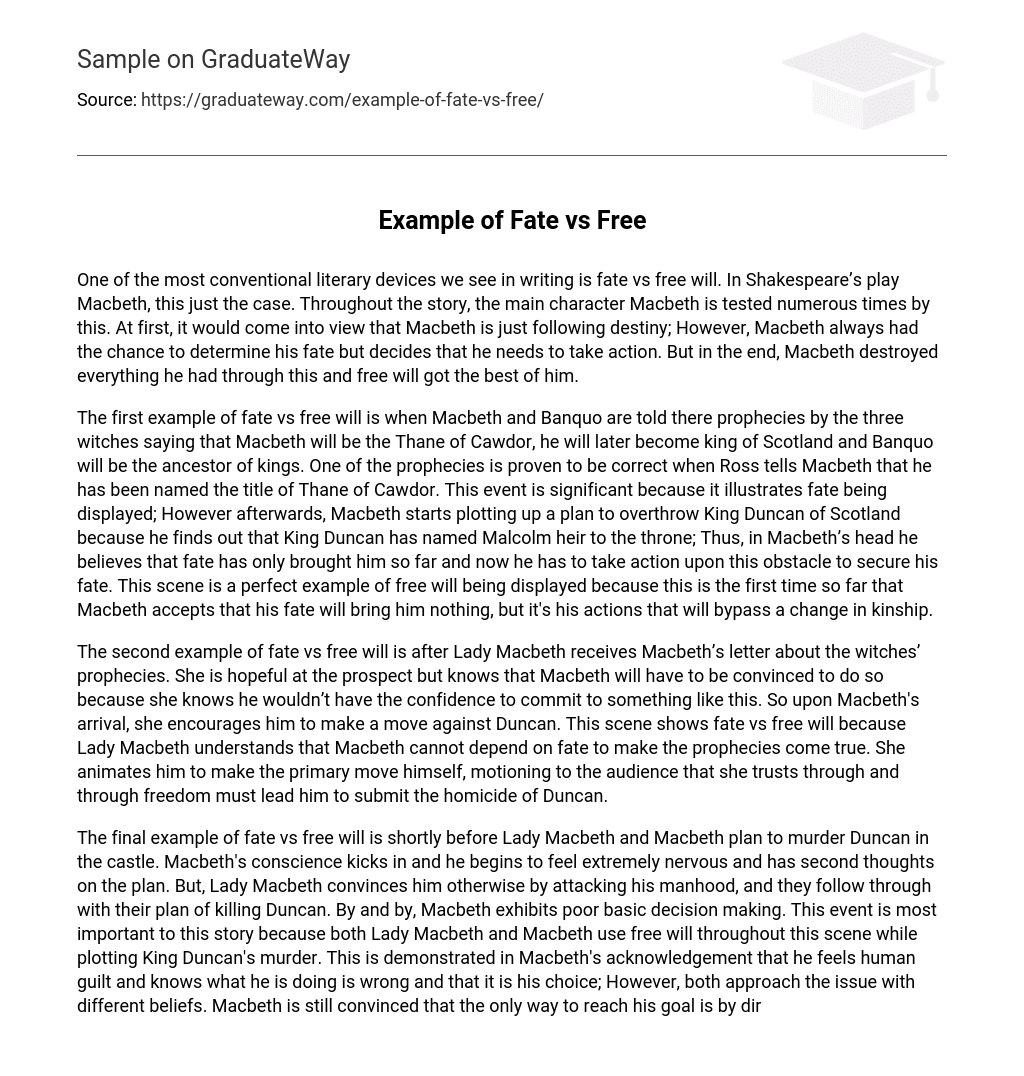One of the most conventional literary devices we see in writing is fate vs free will. In Shakespeare’s play Macbeth, this just the case. Throughout the story, the main character Macbeth is tested numerous times by this. At first, it would come into view that Macbeth is just following destiny; However, Macbeth always had the chance to determine his fate but decides that he needs to take action. But in the end, Macbeth destroyed everything he had through this and free will got the best of him.
The first example of fate vs free will is when Macbeth and Banquo are told there prophecies by the three witches saying that Macbeth will be the Thane of Cawdor, he will later become king of Scotland and Banquo will be the ancestor of kings. One of the prophecies is proven to be correct when Ross tells Macbeth that he has been named the title of Thane of Cawdor. This event is significant because it illustrates fate being displayed; However afterwards, Macbeth starts plotting up a plan to overthrow King Duncan of Scotland because he finds out that King Duncan has named Malcolm heir to the throne; Thus, in Macbeth’s head he believes that fate has only brought him so far and now he has to take action upon this obstacle to secure his fate. This scene is a perfect example of free will being displayed because this is the first time so far that Macbeth accepts that his fate will bring him nothing, but it’s his actions that will bypass a change in kinship.
The second example of fate vs free will is after Lady Macbeth receives Macbeth’s letter about the witches’ prophecies. She is hopeful at the prospect but knows that Macbeth will have to be convinced to do so because she knows he wouldn’t have the confidence to commit to something like this. So upon Macbeth’s arrival, she encourages him to make a move against Duncan. This scene shows fate vs free will because Lady Macbeth understands that Macbeth cannot depend on fate to make the prophecies come true. She animates him to make the primary move himself, motioning to the audience that she trusts through and through freedom must lead him to submit the homicide of Duncan.
The final example of fate vs free will is shortly before Lady Macbeth and Macbeth plan to murder Duncan in the castle. Macbeth’s conscience kicks in and he begins to feel extremely nervous and has second thoughts on the plan. But, Lady Macbeth convinces him otherwise by attacking his manhood, and they follow through with their plan of killing Duncan. By and by, Macbeth exhibits poor basic decision making. This event is most important to this story because both Lady Macbeth and Macbeth use free will throughout this scene while plotting King Duncan’s murder. This is demonstrated in Macbeth’s acknowledgement that he feels human guilt and knows what he is doing is wrong and that it is his choice; However, both approach the issue with different beliefs. Macbeth is still convinced that the only way to reach his goal is by direct action motivated by his perception of justice, while Lady Macbeth believes that free will is foremost.
In the end, there is a question whether Macbeth is driven by fate or free will. The three witches approach Macbeth with prophecies that will all come true in the end. Macbeth had the opportunity to better his life with his fate, but instead, he took advantage of free will and in the end lost everything





